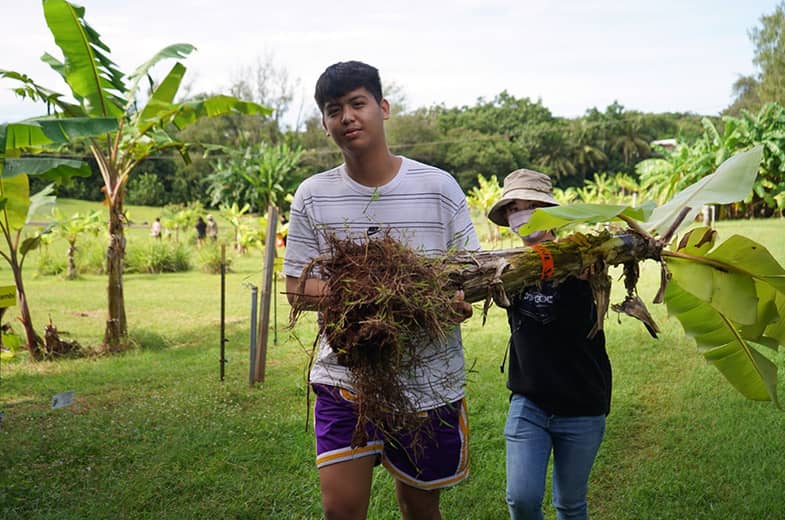UOG wins $10M grant to advance the agriculture and natural resources workforce in Micronesia
UOG wins $10M grant to advance the agriculture and natural resources workforce in Micronesia
UOG wins $10M grant to advance the agriculture and natural resources workforce in Micronesia
7/6/2023
Developing the next generation of agriculture, food, nutrition, and natural resources professionals in the Mariana and Micronesian islands is the focus of a new $10 million grant awarded to the University of Guam College of Natural & Applied Sciences.
 “This is a major grant for UOG and this region,” said Rachael Leon Guerrero, vice
provost for research. “It’s the university’s second largest grant ever, following
the EPSCoR grant, and it’s the largest amount of funding that has ever come to UOG focused solely
on undergraduate STEM and agriculture education.”
“This is a major grant for UOG and this region,” said Rachael Leon Guerrero, vice
provost for research. “It’s the university’s second largest grant ever, following
the EPSCoR grant, and it’s the largest amount of funding that has ever come to UOG focused solely
on undergraduate STEM and agriculture education.”
The grant project serves students at UOG, Northern Marianas College, and Guam Community College through a cooperative bachelor’s program with several larger U.S. universities. It is one of 33 grants awarded to minority-serving institutions by the USDA National Institute of Food and Agriculture’s “From Learning to Leading: Cultivating the Next Generation of Diverse Food and Agriculture Professionals Program,” or NextGen — a $262 million investment in higher education institutions through the Inflation Reduction Act.
With the islands of Micronesia being vulnerable to food shortages and environmental catastrophes brought on by climate change and invasive species, the project seeks to bolster the workforce with local professionals who can help combat these challenges.
Cooperative course-sharing

In the cooperative bachelor’s degree program, students enrolled in agriculture and natural resource-focused programs at UOG, GCC, and NMC will be able to take in-depth, specialized courses in their subject areas from Utah State University, University of Florida, and University of Hawaii at Manoa. Students can either take the courses online or via a semester abroad.
“Our islands are in need of larger scale agricultural production to facilitate food security, wildlife biologists and land managers to control invasive species, and ecologists to restore our native species, to name a few critical areas,” said Dr. Lee S. Yudin, dean of the UOG College of Natural & Applied Sciences and project director on the grant. “This project combines the resources of multiple institutions to expose our students to these career possibilities and ensure they’re the best candidates to fill these jobs.”
Internships, research experiences, and scholarships
Students will also benefit from high-impact learning experiences — such as internships, research programs, and study-abroad opportunities — with the partner universities and local government agencies. These hands-on experiences combined with the advanced courses will boost local graduates’ resumes, making them more competitive, particularly for federal jobs that are available locally.
Additionally, the program will provide scholarships to cover childcare, room and board, and tuition costs, which can prohibit residents from pursuing or finishing bachelor’s degrees in food, agriculture, nutrition, or human sciences or advancing in their related jobs.
The NextGen cooperative bachelor’s degree project will be supported by the Research Corporation of the University of Guam over its five-year term ending May 31, 2028. A webpage with more details on the upcoming opportunities will be launched this fall. Students and prospective students in Guam and the rest of Micronesia interested in studying food, agriculture, nutrition, natural resources, or child and family sciences can contact Dr. Rachel Jolley, co-project director, at jollyr@triton.uog.edu for more information.


